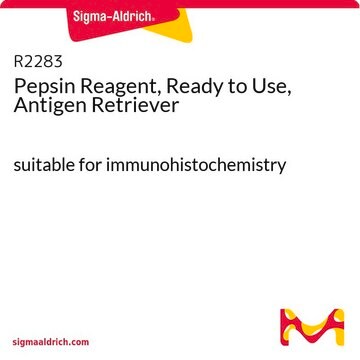SRE0001
Pepsin from porcine gastric mucosa
Suitable for manufacturing of diagnostic kits and reagents, lyophilized powder, ≥3200 units/mg protein
Synonym(s):
Pepsin A, Pepsin from hog stomach
About This Item
Recommended Products
Quality Level
form
lyophilized powder
specific activity
≥3200 units/mg protein
mol wt
35 kDa
impurities
salt, essentially free
color
white to off-white
UniProt accession no.
application(s)
diagnostic assay manufacturing
shipped in
wet ice
storage temp.
−20°C
Gene Information
pig ... LOC396892(396892)
Looking for similar products? Visit Product Comparison Guide
Application
Biochem/physiol Actions
Unit Definition
Analysis Note
Other Notes
inhibitor
Signal Word
Danger
Hazard Statements
Precautionary Statements
Hazard Classifications
Eye Irrit. 2 - Resp. Sens. 1 - Skin Irrit. 2 - STOT SE 3
Target Organs
Respiratory system
Storage Class Code
11 - Combustible Solids
WGK
WGK 1
Flash Point(F)
Not applicable
Flash Point(C)
Not applicable
Choose from one of the most recent versions:
Certificates of Analysis (COA)
Don't see the Right Version?
If you require a particular version, you can look up a specific certificate by the Lot or Batch number.
Already Own This Product?
Find documentation for the products that you have recently purchased in the Document Library.
Customers Also Viewed
Our team of scientists has experience in all areas of research including Life Science, Material Science, Chemical Synthesis, Chromatography, Analytical and many others.
Contact Technical Service








